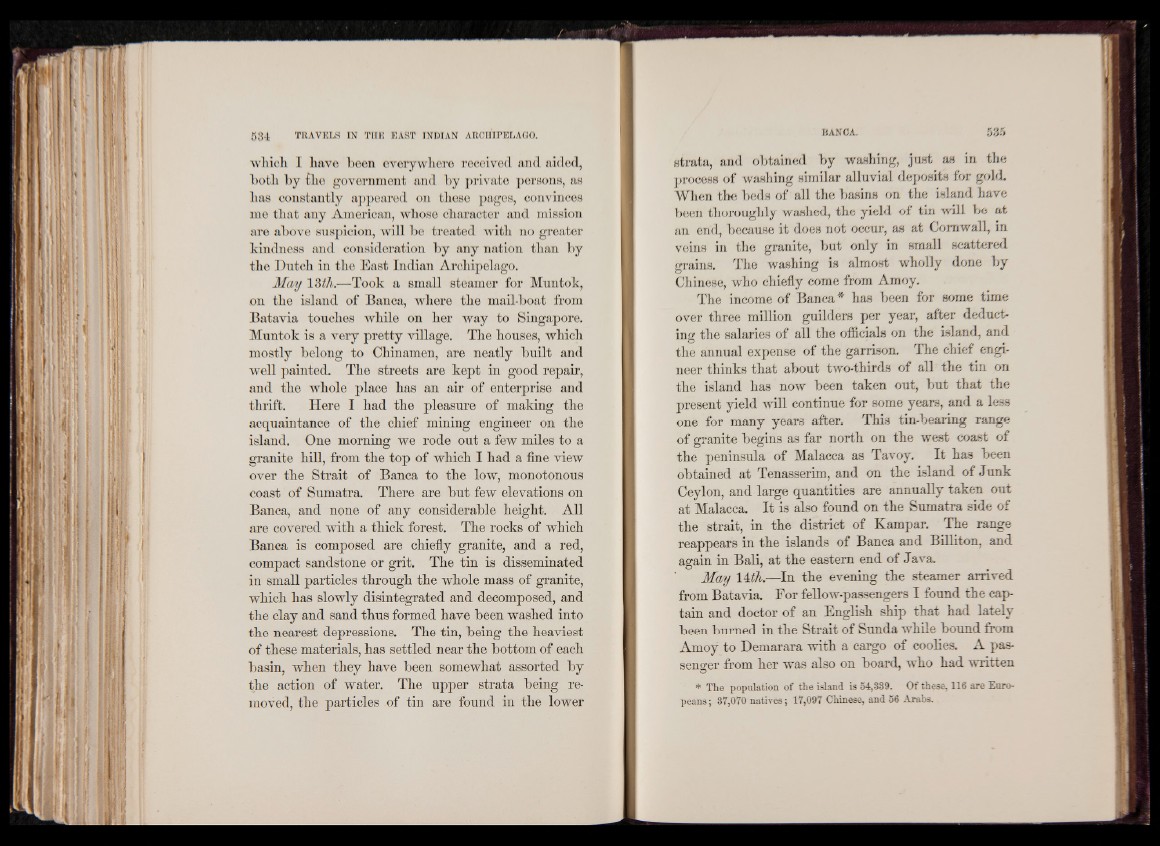
which I have been everywhere received and aided,
both by the government and by private persons, as
has constantly appeared on these pages, convinces
me that any American, whose character and mission
are above suspicion, will be treated with no greater
kindness and consideration by any nation than by
the Dutch in the East Indian Archipelago.
May 13th.—Took a small steamer for Muntok,
on the island of Banca, where the mail-boat from
Batavia touches while on her way to Singapore.
Muntok is a very pretty village. The houses, which
mostly belong to Chinamen, are neatly built and
well painted. The streets are kept in good repair,
and the whole place has an air of enterprise and
thrift. Here I had the pleasure of making the
acquaintance of the chief mining engineer on the
island. One morning we rode out a few miles to a
granite hill, from the top of which I had a fine view
over the Strait of Banca to the low, monotonous
coast of Sumatra. There are but few elevations on
Banca, and none of any considerable height. All
are covered with a thick forest. The rocks of which
Banca is composed are chiefly granite, and a red,
compact sandstone or grit. The tin is disseminated
in small particles through the whole mass of granite,
which has slowly disintegrated and decomposed, and
the clay and sand thus formed have been washed into
the nearest depressions. The tin, being the heaviest
of these materials, has settled near the bottom of each
basin, when they have been somewhat assorted by
the action of water. The upper strata being removed,
the particles of tin are found in the lower
strata, and obtained by washing, just as in the
process of washing similar alluvial deposits for gold.
When the beds of all the basins on the island have
been thoroughly washed, the yield of tin will be at
an end, because it does not occur, as at Cornwall, in
veins in the granite, but only in small scattered
grains. The washing is almost wholly done by
Chinese, who chiefly come from Amoy.
The income of Banca* has been for some time
over three million guilders per year, after deducting
the salaries of all the officials O on the isla^ nd, and#
the annual expense of the garrison. The chief engineer
thinks that about two-thirds of all the tin on
the island has now been taken out, but that the
present yield will continue for some years, and a less
one for many years after. This tin-bearing range
of granite begins as far north on the west coast of
the peninsula of Malacca as Tavoy. I t has been
obtained at Tenasserim, and on the island of Junk
Ceylon, and large quantities are annually taken out
at Malacca. It is also found on the Sumatra side of
the strait, in the district of Kampar. The range
reappears in the islands of Banca and Billiton, and
again in Bali, at the eastern end of Java.
May 1 Mh.—In the evening the steamer arrived
from Batavia. For fellow-passengers I found the captain
and doctor of an English ship that had lately
been burned in the Strait of Sunda while bound from
Amoy to Demarara with a cargo of coolies. A passenoger
from her was also on board, who had written
* The population of the island is 54,389. Of these, 116 are Europeans
; 3T,070 natives; 17,097 Chinese, and 56 Arabs.